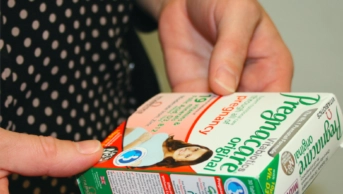
John Mccain iii/Dreamstime.com
This content was published in 2010. We do not recommend that you take any clinical decisions based on this information without first ensuring you have checked the latest guidance.
A. Common situations in which women require menstruation to be delayed or stopped include honeymoons, holidays, religious events (eg, a pilgrimage such as haj), a new or long distance relationship, prolonged menses, sporting events and minor surgery.
Norethisterone
The progestogen norethisterone can be prescribed for delaying menstruation. Taken at a dose of 5mg three times daily, starting two to three days before menstruation is expected, it stabilises the endometrium. The norethisterone is taken until menstruation is no longer unwanted. Use is normally short term but there is no time limit set by summaries of product characteristics (eg, for endometriosis SPCs suggest use for several months). Side effects are relatively common and can include mood disturbances and acneiform skin eruptions. The woman should be counselled about these possible reactions because they might also spoil a honeymoon, and she might prefer to have a normal period. About 10 per cent of women experience breakthrough bleeding.
Fertility
Norethisterone in a daily dose of 350µg (eg, Micronor, Noriday) is contraceptive during the time that it is taken, and although the higher dose used to prevent bleeding has not been tested for contraceptive efficacy, it is reasonable to assume that it would be unlikely that the woman would fall pregnant while she is taking it. However, if she actively does not want to get pregnant, alternative contraception is still advisable. A period would usually start a few days after stopping the norethisterone. There should be no effect on the normal cycle after this, and there is no evidence that fertility will be affected in the long term.
Contraindications
Contraindications to norethisterone include pregnancy and severe disturbances of liver function. Thromboembolic disease is also mentioned in the SPC and, as with all progestogens, there are concerns about venous thromboembolism. Although the risk is significantly higher with oestrogens, there have been some studies linking the higher dose progestogens with venous thromboembolism, (hence the advice in SPCs suggesting that this hormone should be discontinued before major surgery with immobilisation).
Options
This woman may be too late to prevent menstruation altogether but norethisterone is also licensed for dysfunctional uterine bleeding, — it will stop bleeding within two or three days — and might still be considered here. The woman could also start a combined oral contraceptive pill straight away (outside the terms of the product licence) which could delay her period but this may not have such a reliable effect and may indeed prolong menstruation if it has already started or cause irregular bleeding in the first three months of use. A combined oral contraceptive should only be prescribed if the woman does not have a contraindication to oestrogen and if she has not had a risk of pregnancy in the month leading up to the wedding. Various herbal products (eg, shepherd’s purse [Capsella Bursa-pastoris]) and yarrow [Achillea millefolium]) have been claimed to help in situations such as these but evidence is scarce. An alternative might be a menstrual cup, which fits over the cervix and collects the menstrual flow. However, these are mainly available by mail order so might not be delivered in time.
The pill
If the woman was taking a combined oral contraceptive pill, she could just start her next packet without a break and this would achieve the desired effect; the only likely side effect would be breakthrough bleeding.
You might also be interested in…
How to select the right mouthwash

Thalassaemia and iron supplements
